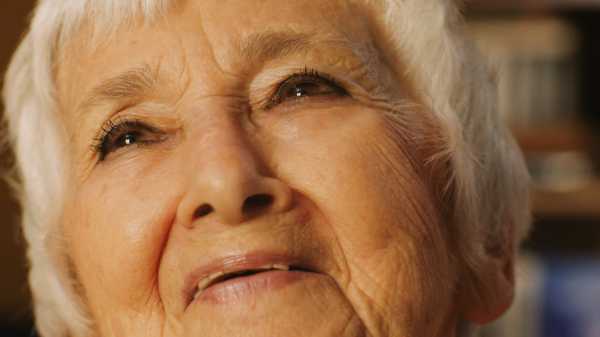
Save this storySave this storySave this storySave this story
“We’re a vanishing breed,” Lombroso’s grandmother told him. “So, if you want to do this, you’d better hurry.”
A week after Donald Trump won the Presidency, I sat in a folding chair in the house I was renting in Washington, D.C., and prepared to shave off my beloved poof of hair. The following morning, I was heading to a rally hosted by the white nationalist Richard Spencer, where I captured footage that ultimately became part of my début feature film, “White Noise,” and I figured it would be smart to downplay my Jewish looks. My housemate turned on his electric razor. I hesitated about attending the rally. Something didn’t feel right. I needed advice—not from my editor but from my grandmother, Nina. “Don’t do it,” she said, as I rattled off all the reasons that this reporting mattered. “But, if you do, be careful. And call me.”
I grew up around Holocaust survivors. As a kid in suburban New York in the late nineteen-nineties and early two-thousands, I knew that many of my relatives and family friends had heart-wrenching memories of living through genocide. The stories were so commonplace in our community that it was possible, as a kid, to shrug them off. My friends and I felt a vague obligation to keep our culture alive after its near-complete destruction, but we were more preoccupied with sports, or school, or girls, to give these histories the focus and respect that they deserved. Sometimes, when a survivor would bring a TV into our Hebrew-school class to show us a program on Auschwitz, we would protest that we wanted to watch “Seinfeld.”
The New Yorker Documentary
View the latest or submit your own film.

My grandmother was seven years old and living in Poland when Hitler invaded and started the Second World War. When I was growing up, my grandmother was silent about her experience. She was tough but funny. She never wasted a scrap of food. She possessed incredible knowledge, despite being forced to cut short her formal education during the war. She was a rock in my life, and a voice of moral clarity. I sensed that the attributes that made her so special were a product of her history, but I didn’t probe. I never asked her what happened in Poland. No one did.
As I got older, my social circle included more and more non-Jewish friends and girlfriends. I discovered that the presence I’d taken for granted was something rare: most people in my adult life had never met a survivor. Many didn’t even know that six million Jews had been murdered during the Holocaust. I was shocked to discover that a relative of someone I was close to secretly harbored neo-Nazi views, and studied “Mein Kampf” in his free time. I found a copy of the book at his house, littered with notes in the margins about how to deal with the Jewish problem.
So I called my grandmother again, this time asking to make a film about her life. “There’s no story here,” she said. I told her that I wanted my kids and grandkids to know her history, that antisemitism was rising once again, and that someone very close to me was seduced by the same evils she faced decades ago. The testimony of a real, living survivor could be a powerful antidote. “We’re a vanishing breed,” she relented. “So, if you want to do this, you’d better hurry.”
In July, 2022, I moved into her Long Island house with a small film crew and began production on “Nina & Irena,” about how my grandmother survived the Holocaust. Since my grandfather died, more than a decade ago, she’s lived alone, spending her days playing bridge at a community center, practicing yoga, and feeding the birds in her back yard. There are traces of the life she fled in Europe, but you have to look closely. On her piano, between images of her children, grandchildren, and great-grandchildren, is a small cutout photograph of her older sister, Irena, who disappeared eighty years ago. Why hadn’t I ever asked her who that was?
As we began filming, Nina sat down in her yellow chair, her white hair freshly styled, and took a last sip of her iced coffee. “Hello, ladies and gentlemen,” she said, as the lights hit her ageless face. We embarked on a days-long conversation: about her assimilated upbringing in Poland (“I have never seen a shtetl”); hiding with fake papers opposite the Warsaw ghetto and seeing corpses on the street (“I don’t know who eventually picked up the bodies”); the disappearance of her sister and around twenty-five family members (or “everybody,” as she put it); and her father’s charismatic ability to repeatedly talk his way out of death (“the chutzpah he had”). The crew members were crying. As a documentarian, I know to nudge subjects toward expressing their emotions—their anger or tears are what help a story hit home to an audience. But when I pushed my grandmother in that direction, she’d scold me. She remained stoic. This wasn’t a story of victimhood.
“It’s the absence of tears that gives it such extraordinary poignancy,” Errol Morris, the legendary filmmaker, wrote to me after watching. Morris’s direct-to-camera look and irreverence have inspired my work for years, and shaped this film in particular. Morris has interviewed John le Carré, Donald Rumsfeld, and Robert McNamara—and he couldn’t get enough of my grandmother. “She’s fucking incredible,” he called me to say. He later added, “one of the more extraordinary characters I’ve ever seen on film.”
Recently, at the age of ninety-one, my grandmother took a plane from New York to California to present her story at the Museum of Tolerance, part of an educational tour we’ve embarked on together, before Holocaust survivors disappear. Underpinning the conversation was tension: the deadliest attack for Jews since the Holocaust and a pummelling response for Palestinians in Gaza. Nina’s humanism came forward that evening, as it does in the film.
“We are all born little adorable children,” she asked. “What happens?”
Toward the end of the war, Nina watched Czech civilians burn a German person alive. I figured the perpetrators deserved it. After all, the Nazis killed all four of her grandparents, as well as nearly every aunt, uncle, and cousin. My grandmother stopped me. Revenge is never right. “You don’t do that to other human beings,” she said, expecting better of her youngest grandson. “Come on.”
Nearly eighty years after the Holocaust, Jewish life feels uncertain again. When my grandmother is gone, I don’t know who I’ll call to make sense of the world. But we have time together still, and I had better not waste it by sitting in silence. “You should come and visit me more often,” she said, squeezing my hand. “And not just for the movie.”
Click here to access a downloadable PDF that can be used to facilitate discussions about the film, at home or in the classroom.
Sourse: newyorker.com
